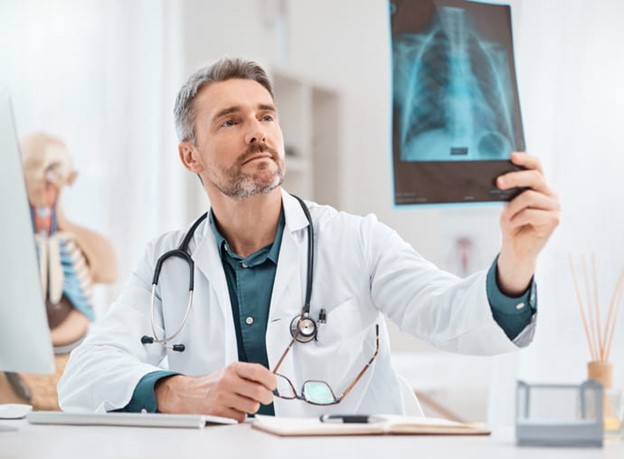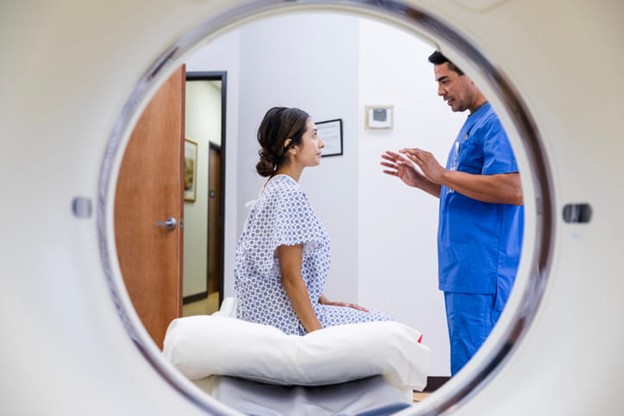
Cancer and heart disease are two of the most serious medical diagnoses a person can receive. Living with both illnesses at once seems unlikely, but according to statistics from the Mayo Clinic, around 25% of cancer survivors have also been diagnosed with cardiovascular disease. This suggests there are links between the two diseases.
There are many lifestyle changes suggested for avoiding cancer and cardiovascular health issues, but not all of the risks are under your control. Genetics and environmental exposure can also play a role. Being treated for cancer is another risk factor.
A cancer diagnosis can present challenges that are specific to cardiovascular health because some of the treatments for cancer can damage the heart and blood vessels. In addition, prolonged illness can cause you to become less active and increase the risk for cardiovascular disease.
A preventative medical scan may be recommended if you are undergoing cancer treatment. Preventative health scans provide a way to protect the heart and detect cardiovascular problems before they become serious health risks.
Schedule your CT scan.
The Link Between Heart Disease and Cancer
A 2022 study found that cancer survivors have a 42% greater risk of developing cardiovascular disease (CVD) than people who have never been treated for cancer. Cancer treatments can extend life, but side effects can cause or worsen CVD conditions, including:
- Coronary artery disease
- Damage to heart valves
- Congestive heart failure
- Cardiomyopathy
- High blood pressure
- Myocarditis (inflammation of the heart muscle)
Not all cancer types are associated with a higher risk of CVD. Colorectal, lung, breast, and hematological and lymphatic cancers appear to be most closely linked with CVD.
How Does Cancer Affect the Heart?
Cancer and cancer treatments can seriously impact heart health. Heart issues that develop as a result of cancer treatment are known as “cancer-treatment-related cardiotoxicity.” Cardiotoxicity can damage heart vessels and heart valves and impact the heart’s ability to pump blood efficiently.
Radiation is also linked to an increase in CVD, and the side effects of chemotherapy include cardiomyopathy — a disease of the heart muscle. Your doctor can help you balance the risks and benefits of different cancer treatments.
What Cardiovascular Risk Factors Are Associated With Future Cancer?
There are several cardiovascular risk factors that are also associated with future cancer, including age, sex, and lifestyle choices such as smoking status. However, there are other overlooked factors, such as mental health conditions.
Cancer, CVD, and Age
One of the links between cancer and cardiovascular disease is living longer. As cancer survivors get older, they are subject to the same health risks that everyone else faces in the later years of life.
As early as your 20s, your cardiovascular system begins to undergo natural changes. Little by little, the wear and tear of normal living can cause damage to your heart and cardiovascular system. The risk of developing heart problems increases as you get older due to these normal age-related changes.
Cancer, CVD, and Lifestyle
Many of the same lifestyle choices that increase the risk of cancer can also increase the risk of cardiovascular disease. These choices include:
- Smoking
- Not maintaining a healthy weight
- Consuming alcohol in excess
- Not eating a healthy diet rich in fruits and vegetables
- Not engaging in regular physical activity
- Avoiding stress management techniques
Living a healthy lifestyle that includes practicing good sleep habits may help reduce your risk of developing either cancer or heart disease.
Cancer, CVD, and Mental Health
An often overlooked way to reduce the risk of cancer and heart attack is taking care of your mental health. The American Heart Association reports that depression and other mental health concerns can increase a person’s risk of heart disease. In addition, depression can also increase the risk of cancer.
Following healthy lifestyle habits, talking to a mental health professional, and taking medications if needed are recommended treatments for most mental health disorders. Taking care of your mental and emotional health may help you prevent heart attack, cancer, and stroke.
Related: Relationship Between Stress and Cardiovascular Health
Reducing the Risk
If you are a cancer survivor or currently undergoing cancer treatments, your oncologist will recommend several ways of reducing the risk of developing cardiovascular disease. Because many of the risk factors for both cancer and cardiovascular health problems are shared, adopting healthy lifestyle habits is the first step to lowering risks.
Cardiovascular toxicity and cardiomyopathy related to cancer treatments are current areas of scientific study. Your oncologist may prescribe certain medications to counteract the negative impact of chemotherapy and radiation.
Undergoing a regularly scheduled preventative medical scan is also advised. Ultimately, it is up to you and your medical team to weigh the risks of aggressive cancer treatments and decide what is right for you.
What Is a Preventative Scan?
A preventative medical scan is a non-invasive test that helps to identify different risk factors for stroke, heart disease, and other health issues.
One example of a preventative scan is a mammogram. Like a mammogram, a preventative scan does not diagnose a health problem, but it does alert your medical team to the warning signs of a potential problem. Preventive scans are often used to catch cancer and heart health issues early so that treatment can be initiated.
Related: Who is at Risk for Heart Disease?
Are You Looking for a “Preventative Medical Scan Near Me?”
Preventative Diagnostic Center in Las Vegas, NV, offers a variety of health scans to help you protect against cancer, cardiovascular disease, and other illnesses. A preventative cancer scan, such as a virtual colonoscopy, may not require an order from your regular doctor. Speak with one of our knowledgeable staff members to schedule your CT scan today.
Book your CT scan.
Sources:
Cardiol, J., et al. (2022). The Atherosclerosis Risk in Communities (ARIC) Study.
Hanson, W. (2020). Cancer and Cardiovascular Health.
Lau, Emily S., et al. (2021). Cardiovascular Risk Factors Are Associated with Future Cancer.
Mental Health and Heart Health. (2023).
Santos Longhurst, A. (2019). Is It Possible to Become Physically Sick from Depression?

